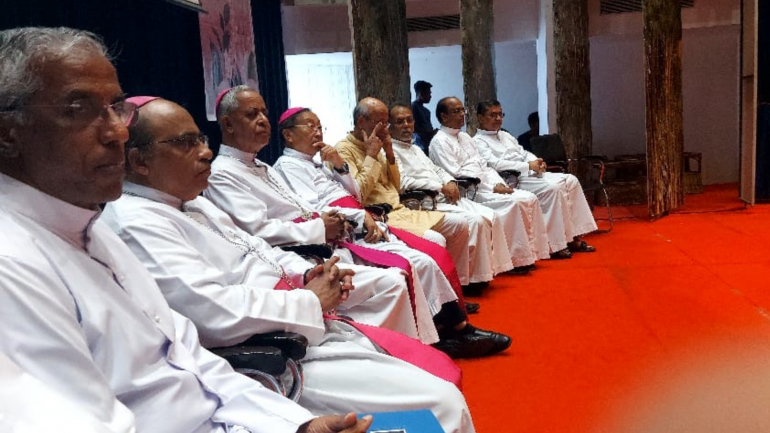Indian Canonists address Church Penal Sanctions at 37th Annual Conference

The 37th annual conference of the Canon Law Society of India began on October 14 in Guwahati, Assam, where over 130 canon law experts from across the country gathered to discuss the theme, “Penal Sanctions in the Church.”
The event, which runs until October 18, aims to deepen the understanding of Church law to better serve dioceses and major superiors.
In his keynote address, Archbishop John Moolachira of Guwahati highlighted the importance of understanding canon law in assisting Church leadership. He stressed that while punitive actions are sometimes necessary, they should not be the first recourse.
“Punishment should be preceded by kind admonitions, fraternal corrections, earnest entreaties, and firm rebukes,” he said, emphasizing the need for compassion and pastoral care.
Archbishop Moolachira reflected on the early Church’s foundation of love and service, noting that penalties may sometimes be necessary to maintain the integrity of individuals and the community.
He also reiterated the three key goals of Pope Francis' recent modifications to Canon Law: restoring justice, correcting offenders, and repairing scandal.
Father T. Lourdusamy, president of the Canon Law Society, stated that the conference, held for the first time in Northeast India, provides crucial insights into the role of penal sanctions in preserving the integrity of Church communities.
He stressed the importance of collaborative efforts among canonists to navigate the evolving landscape of Church law.
Archbishop Linus Nelli of Imphal spoke on the progressive easing of Church penalties since the 1917 revision of canon law, stressing that the Church must adapt to today’s realities.
He emphasized the pastoral dimensions of the revised penal norms, which focus on reparative and salvific goals.
Archbishop Nelli also linked the Church's legal framework to broader societal efforts, citing Prime Minister Narendra Modi’s vision of a “new confident India” centered on justice and fairness rather than retribution.
In light of contemporary challenges, Archbishop Nelli also addressed the intersection of canon law and civil legislation, particularly the Protection of Children from Sexual Offenses Act (POCSO).
He underscored the importance of respecting civil law while maintaining the spirit of Canon Law, allowing for potential mitigation after civil penalties have been imposed.
Bishop Albert Hemrom of Dibrugarh, chairman of the Canon Law Commission of the Northeast Bishops' Council, welcomed participants and introduced a discussion on the dismissal of clerics.
He emphasized that understanding Church law is essential to addressing issues within the Church effectively.
Cardinal Oswald Gracias, founder of the Canon Law Society, addressed the conference via video from Rome, where he is attending the Bishops' Synod on Synodality.
He urged canonists to stay informed about the latest revisions to Church law and to reflect on how the Church can become more synodal, adapting its structures to meet modern challenges.
The Canon Law Society of India, established in 1987 in Chennai, held this conference in the Northeast for the first time, marking a significant milestone after 36 years of discussions in various regions across India.
Radio Veritas Asia (RVA), a media platform of the Catholic Church, aims to share Christ. RVA started in 1969 as a continental Catholic radio station to serve Asian countries in their respective local language, thus earning the tag “the Voice of Asian Christianity.” Responding to the emerging context, RVA embraced media platforms to connect with the global Asian audience via its 21 language websites and various social media platforms.

















